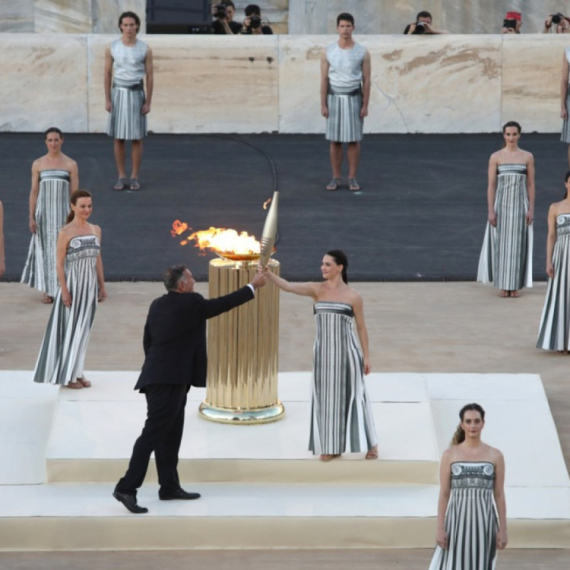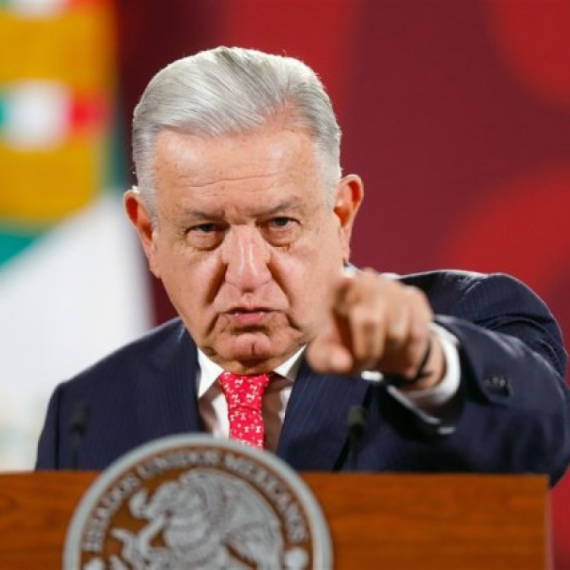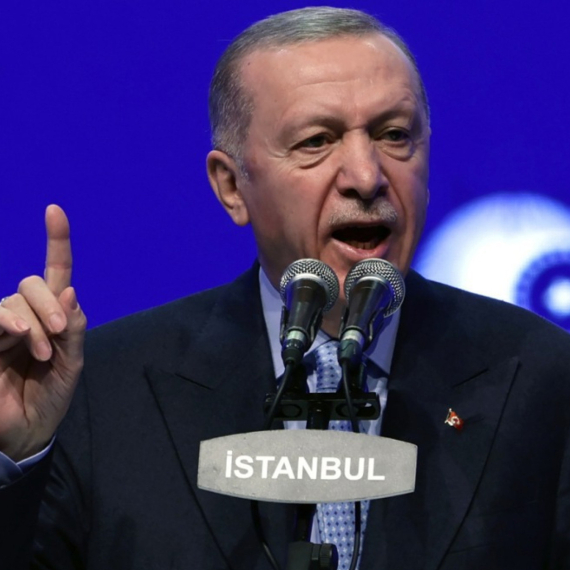Jeremić: EU membership without recognizing Kosovo
Foreign Minister Vuk Jeremić says that he believes Serbia will be able to join the European Union without recognizing Kosovo’s unilateral independence.
Thursday, 25.06.2009.
12:47

Foreign Minister Vuk Jeremic says that he believes Serbia will be able to join the European Union without recognizing Kosovo’s unilateral independence. In an interview with weekly Vreme, Jeremic said that he expected the question of Kosovo’s final status to be resolved before entrance into the EU, and that further dialogue with Pristina and an agreement “acceptable to all” would be found after the International Court of Justice gave its opinion on the legality of Kosovo’s independence declaration. Jeremic: EU membership without recognizing Kosovo “There is no way that Serbia will recognize Kosovo under any conditions. On the other hand, Serbia will become an EU member-state, as will all the other countries of the Western Balkans. I am not saying that it will be easy to achieve this goal, but I believe that we will succeed,” the minister said. Asked what his optimism was based on, Jeremic said that he believed that the issue of Kosovo’s final status would be resolved before joining the EU, given the dynamics of this process. “I expect there to be a solution for Kosovo’s future status after the International Court of Justice gives its opinion. And, in order for the solution to be acceptable for Serbia, the Albanian citizens of Kosovo need to say that they were wrong regarding the issue of independence and that they accept Serbia as their country,” he added. He said that he was confident that the ICJ would state that the declaration of Kosovo independence had violated international law, adding that, “in this case, Pristina will find itself in a ‘zero-gravity situation’, because there will be no new recognitions.” “After such a decision, it is clear that Kosovo will not be able to become a member of any international organizations. Pristina will only be able to emerge from this situation through dialogue with Belgrade,” the foreign minister said. Jeremic said that he did not want to prejudge what the final solution for Kosovo’s future status could be, adding that Belgrade was in favor of new negotiations where both sides would have an equally strong motive to reach a successful conclusion—namely, reaching a compromise solution. He said that he was trying to pursue the government’s three foreign policy priorities: increasing the speed of European integration, preserving the country’s territorial integrity, and improving regional cooperation. Last week, he said, had shown that Serbia was capable of holding its own on all three fronts. “Along with the decision to liberalize the EU visa regime, we had what we believe was a very successful meeting of the UN Security Council, while the meeting in Novi Sad showed that Serbia is a leader in the region. Strong criticism has been leveled at our diplomacy, on the grounds that the three defined priorities of our foreign policy are on a collision course with one another and that they simply cannot be achieved. I think the events of last week have blown these claims out of the water,” Jeremic said. The minister said that the scrapping of visas still required implementation of the pre-agreed technical solutions, and that the problem with passports for Serbian citizens of Albanian ethnicity living in Kosovo could be resolved by “agreeing a control mechanism.” Asked whether this meant that security measures would be so complicated that Serbian citizens of Albanian ethnicity living in Kosovo would not be able to receive Serbian passports anyway, Jeremic said that these “security measures will be adequate and in line with the security conditions in Serbia.” He said that the holding of the Central European summit in Novi Sad had confirmed Serbia’s regional influence, and that the main declaration of the conference had stated that “the common European future of the entire Balkans has no alternative.” Asked how the policy of defending the country’s territorial integrity was progressing, Jeremic replied that the number of countries that had recognized Kosovo (60 out of 192 UN member-states) was a lot smaller than expected. “Serbia’s diplomatic efforts have yielded results,” the minister said, reiterating that “one of the key elements of Serbia’s strategy is opening the process before the ICJ.” Asked whether he had the impression that he was irritating his counterparts from countries that had recognized Kosovo, Jeremic said that he could understand that Serbia’s stance was not to everyone’s liking, but that the way in which Serbia was working was beyond reproach. “We haven’t made any transgressions, so to speak. That is why we have been able to continue cooperation on all other issues that yield results, both in the EU and the region. We have entered a period in which our differences on the issue of Kosovo’s future status with countries that recognize Kosovo have been legitimized,” Jeremic said. Regarding the decision of Valentin Inzko, the international high representative to Bosnia-Herzegovina, to rescind the declarations passed by the Republic of Srpska parliament on the transfer of powers to the Bosnian state, Jeremic said that Belgrade’s principle was “not to interfere in the internal politics of any country, not even Bosnia, which is a neighboring, independent state.” He said, however, that the actions of the high representative “do not help stabilization,” and that it was time, after 15 years of the high representative’s rule in Bosnia, to establish full democracy. Vuk Jeremic (FoNet, archive)
Jeremić: EU membership without recognizing Kosovo
“There is no way that Serbia will recognize Kosovo under any conditions. On the other hand, Serbia will become an EU member-state, as will all the other countries of the Western Balkans. I am not saying that it will be easy to achieve this goal, but I believe that we will succeed,” the minister said.Asked what his optimism was based on, Jeremić said that he believed that the issue of Kosovo’s final status would be resolved before joining the EU, given the dynamics of this process.
“I expect there to be a solution for Kosovo’s future status after the International Court of Justice gives its opinion. And, in order for the solution to be acceptable for Serbia, the Albanian citizens of Kosovo need to say that they were wrong regarding the issue of independence and that they accept Serbia as their country,” he added.
He said that he was confident that the ICJ would state that the declaration of Kosovo independence had violated international law, adding that, “in this case, Priština will find itself in a ‘zero-gravity situation’, because there will be no new recognitions.”
“After such a decision, it is clear that Kosovo will not be able to become a member of any international organizations. Priština will only be able to emerge from this situation through dialogue with Belgrade,” the foreign minister said.
Jeremić said that he did not want to prejudge what the final solution for Kosovo’s future status could be, adding that Belgrade was in favor of new negotiations where both sides would have an equally strong motive to reach a successful conclusion—namely, reaching a compromise solution.
He said that he was trying to pursue the government’s three foreign policy priorities: increasing the speed of European integration, preserving the country’s territorial integrity, and improving regional cooperation. Last week, he said, had shown that Serbia was capable of holding its own on all three fronts.
“Along with the decision to liberalize the EU visa regime, we had what we believe was a very successful meeting of the UN Security Council, while the meeting in Novi Sad showed that Serbia is a leader in the region. Strong criticism has been leveled at our diplomacy, on the grounds that the three defined priorities of our foreign policy are on a collision course with one another and that they simply cannot be achieved. I think the events of last week have blown these claims out of the water,” Jeremić said.
The minister said that the scrapping of visas still required implementation of the pre-agreed technical solutions, and that the problem with passports for Serbian citizens of Albanian ethnicity living in Kosovo could be resolved by “agreeing a control mechanism.”
Asked whether this meant that security measures would be so complicated that Serbian citizens of Albanian ethnicity living in Kosovo would not be able to receive Serbian passports anyway, Jeremić said that these “security measures will be adequate and in line with the security conditions in Serbia.”
He said that the holding of the Central European summit in Novi Sad had confirmed Serbia’s regional influence, and that the main declaration of the conference had stated that “the common European future of the entire Balkans has no alternative.”
Asked how the policy of defending the country’s territorial integrity was progressing, Jeremić replied that the number of countries that had recognized Kosovo (60 out of 192 UN member-states) was a lot smaller than expected.
“Serbia’s diplomatic efforts have yielded results,” the minister said, reiterating that “one of the key elements of Serbia’s strategy is opening the process before the ICJ.”
Asked whether he had the impression that he was irritating his counterparts from countries that had recognized Kosovo, Jeremić said that he could understand that Serbia’s stance was not to everyone’s liking, but that the way in which Serbia was working was beyond reproach.
“We haven’t made any transgressions, so to speak. That is why we have been able to continue cooperation on all other issues that yield results, both in the EU and the region. We have entered a period in which our differences on the issue of Kosovo’s future status with countries that recognize Kosovo have been legitimized,” Jeremić said.
Regarding the decision of Valentin Inzko, the international high representative to Bosnia-Herzegovina, to rescind the declarations passed by the Republic of Srpska parliament on the transfer of powers to the Bosnian state, Jeremić said that Belgrade’s principle was “not to interfere in the internal politics of any country, not even Bosnia, which is a neighboring, independent state.”
He said, however, that the actions of the high representative “do not help stabilization,” and that it was time, after 15 years of the high representative’s rule in Bosnia, to establish full democracy.


























































Komentari 22
Pogledaj komentare